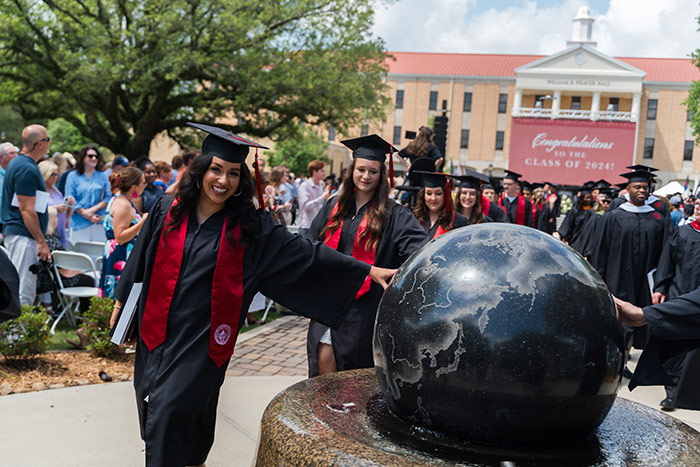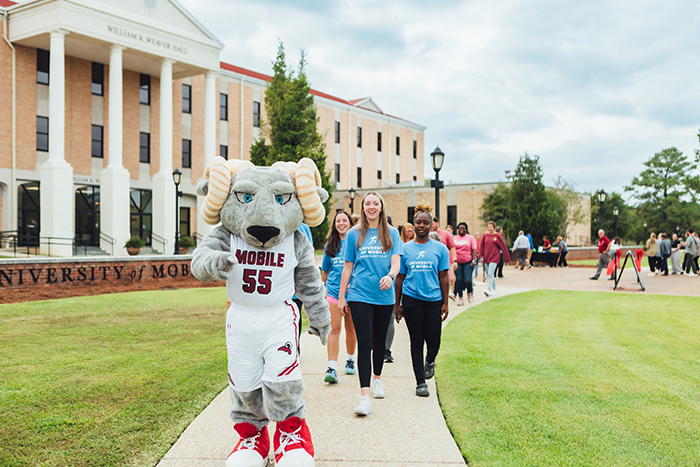The University of Mobile is a Christ-centered liberal arts and sciences university integrating faith and learning with a vision of
Higher Education for a Higher Purpose.
We equip students to follow God’s calling for their lives in an academic community where they are known.
34
States
2092
Total Enrollment
23
Countries
21
NAIA Sports
75+
Academic Programs
880+
Acres of Campus
Statement of Christian Affirmation
AS A CHRISTIAN UNIVERSITY, THE UNIVERSITY OF MOBILE AFFIRMS…
… the Nature of Christ.
Jesus Christ is the physical expression of the eternal, transcendent, and triune God of the universe. To Him we owe the highest love, reverence, and obedience. He is an intelligent, spiritual, and personal Being. He is the Creator, Redeemer, Preserver, and Ruler of the universe and all contained therein.
There is one and only one living and true God. He reveals Himself to us as Father, Son, and Holy Spirit, with distinct personal attributes, but with no division of nature, essence, or being. God is infinite in holiness, justice, and all other perfections. God is all-powerful and all-knowing, and His perfect knowledge extends to all things, past, present, and future, including the future decisions of His free creatures.
God as Father reigns with providential care over His universe, His creatures, and the flow of the stream of human history according to the purposes of His grace. He is all powerful, all knowing, all loving, all wise, and His presence fills the universe He created. God is Father in truth to those who become children of God through faith in Jesus Christ. He is fatherly in His attitude toward all men.
Christ is the eternal Son of God. He possesses and embodies the full nature of God. In His incarnation as Jesus Christ, He was conceived by the Holy Spirit and born by the virgin Mary. Jesus perfectly revealed and did the will of God, taking upon Himself human nature with its demands and necessities, and in so doing, He identified Himself completely with mankind but without sin. He honored divine law by His personal obedience, and, in His substitutionary death on the cross, He made provision for the redemption of men from sin. He was raised from the dead with a glorified body and appeared to His disciples as the person who was with them before His crucifixion. He ascended into heaven and is now exalted at the right hand of God where He is the One Mediator, fully God, fully man, in whose Person is effected the reconciliation between God and man. He will return in power and glory to judge the world and to consummate His redemptive mission. He now dwells in all believers as the living and ever present Lord.
The Holy Spirit is the Spirit of God, fully divine. He inspired holy men of old to write the Scriptures. Through illumination He enables men to understand truth. He exalts Christ. He convicts men of sin, of righteousness, and of judgment. He calls men to the Savior, and effects regeneration. At the moment of regeneration, He baptizes every believer into the Body of Christ. He cultivates Christian character, comforts believers, and bestows the spiritual gifts by which they serve God through His church. He seals the believer for the day of final redemption. His presence in the Christian is the guarantee that God will bring the believer into the fullness of the stature of Christ. He enlightens and empowers the believer and the church in worship, evangelism, and service.
God the Father…Genesis 1:1; 2:7; Exodus 3:14; 6:2-3; 15:11ff.; 20:1ff.; Leviticus 22:2; Deuteronomy 6:4; 32:6; 1 Chronicles 29:10; Psalm 19:1-3; Isaiah 43:3,15; 64:8; Jeremiah 10:10; 17:13; Matthew 6:9ff.; 7:11; 23:9; 28:19; Mark 1:9-11; John 4:24; 5:26; 14:6-13; 17:1-8; Acts 1:7; Romans 8:14-15; 1 Corinthians 8:6; Galatians 4:6; Ephesians 4:6; Colossians 1:15; 1 Timothy 1:17; Hebrews 11:6; 12:9; 1 Peter 1:17; 1 John 5:7.
God the Son…Genesis 18:1ff.; Psalms 2:7ff.; 110:1ff.; Isaiah 7:14; 53; Matthew 1:18-23; 3:17; 8:29; 11:27; 14:33; 16:16,27; 17:5; 27; 28:1-6,19; Mark 1:1; 3:11; Luke 1:35; 4:41; 22:70; 24:46; John 1:1-18,29; 10:30,38; 11:25-27; 12:44-50; 14:7-11; 16:15-16,28; 17:1-5, 21-22; 20:1-20,28; Acts 1:9; 2:22-24; 7:55-56; 9:4-5,20; Romans 1:3-4; 3:23-26; 5:6-21; 8:1-3,34; 10:4; 1 Corinthians 1:30; 2:2; 8:6; 15:1-8,24-28; 2 Corinthians 5:19-21; 8:9; Galatians 4:4-5; Ephesians 1:20; 3:11; 4:7-10; Philippians 2:5-11; Colossians 1:13-22; 2:9; 1 Thessalonians 4:14-18; 1 Timothy 2:5-6; 3:16; Titus 2:13-14; Hebrews 1:1-3; 4:14-15; 7:14-28; 9:12-15,24-28; 12:2; 13:8; 1 Peter 2:21-25; 3:22; 1 John 1:7-9; 3:2; 4:14-15; 5:9; 2 John 7-9; Revelation 1:13-16; 5:9-14; 12:10-11; 13:8; 19:16.
God the Holy Spirit…Genesis 1:2; Judges 14:6; Job 26:13; Psalms 51:11; 139:7ff.; Isaiah 61:1-3; Joel 2:28-32; Matthew 1:18; 3:16; 4:1; 12:28-32; 28:19; Mark 1:10,12; Luke 1:35; 4:1,18-19; 11:13; 12:12; 24:49; John 4:24; 14:16-17,26; 15:26; 16:7-14; Acts 1:8; 2:1-4,38; 4:31; 5:3; 6:3; 7:55; 8:17,39; 10:44; 13:2; 15:28; 16:6; 19:1-6; Romans 8:9-11,14-16,26-27; 1 Corinthians 2:10-14; 3:16; 12:3-11,13; Galatians 4:6; Ephesians 1:13-14; 4:30; 5:18; 1 Thessalonians 5:19; 1 Timothy 3:16; 4:1; 2 Timothy 1:14; 3:16; Hebrews 9:8,14; 2 Peter 1:21; 1 John 4:13; 5:6-7; Revelation 1:10; 22:17.
… the Ethic of Christ.
The ethic of Jesus is love. The model of His self-less love directs and defines our interaction with all persons. The model of His self-less love is most perfectly demonstrated in His sacrificial and substitutionary death, burial, and resurrection and His offer of regeneration to individuals through His saving grace.
His love directs and defines interaction with all persons. All Christians are under obligation to seek to make the love of Christ supreme in our own lives and in human society. Means and methods used for the improvement of society and the establishment of righteousness among men can be truly and permanently helpful only when they are rooted in such love.
The self-less or other-focused nature of God’s love is defined in the person, work, and teaching of Christ and was introduced by Christ as a new way of conducting interpersonal relationships. “A new commandment I give to you, that you love one another, even as I have loved you, that you also love one another.” So important is this concept that Jesus declared it the basis by which his followers would be identified. “By this all men will know that you are My disciples, if you have love for one another.”
Modeling the ethic of Christ, Christians should oppose racism, every form of greed, selfishness, and vice, and all forms of sexual immorality, including adultery, homosexuality, and pornography. We should work to provide for the orphaned, the needy, the abused, the aged, the helpless, and the sick. We should speak on behalf of the unborn and contend for the sanctity of all human life from conception to natural death.
Every Christian should seek to bring industry, government, and society as a whole under the sway of the principles of righteousness, truth, and brotherly love. In order to promote these ends Christians should be ready to work with all persons of good will in any good cause, always being careful to act in the spirit of love without compromising their loyalty to Christ and His truth.
Exodus 20:3-17; Leviticus 6:2-5; Deuteronomy 10:12; 27:17; Psalm 101:5; Micah 6:8; Zechariah 8:16; Matthew 5:13-16,43-48; 22:36-40; 25:35; Mark 1:29-34; 2:3ff.; 10:21; Luke 4:18-21; 10:27-37; 20:25; John 15:12; 17:15; Romans 12–14; 1Corinthians 5:9-10; 6:1-7; 6:9-10,13; 7:20-24; 10:23-11:1; Galatians 3:26-28; 5:19-24; Ephesians 6:5-9; Colossians 3:12-17; 1 Thessalonians 3:12; Philemon; James 1:27; 2:8.
… the Mission of Christ.
The mission of Christ is to save the world from sin, offering reconciliation to God and eternal life to all persons who accept His salvation. It is the duty and privilege of every follower of Christ to participate in His mission, seeking constantly to win the lost to Christ by verbal witness undergirded by a Christian lifestyle, and by other methods in harmony with the gospel of Christ.
Man is the special creation of God, made in His own image. He created them male and female as the crowning work of His creation. The gift of gender is thus part of the intent and goodness of God’s creation. In the beginning man was innocent of sin and was endowed by his Creator with freedom of choice. By his free choice man sinned against God and brought sin into the human race. Through the temptation of Satan man transgressed the command of God, and fell from his original innocence whereby his posterity inherit a nature and an environment inclined toward sin. Therefore, as soon as they are capable of moral action, they become transgressors and are under condemnation. Only the grace of God can bring man into His holy fellowship and enable man to fulfill the creative purpose of God. The sacredness of human personality is evident in that God created man in His own image, and in that Christ died for man; therefore, every person of every race possesses full dignity and is worthy of respect and Christian love.
God has ordained the family as the foundational institution of human society. It is composed of persons related to one another by marriage, blood, or adoption.
Marriage is the uniting of one man and one woman in covenant commitment for a lifetime. It is God’s unique gift to reveal the union between Christ and His church and to provide for the man and the woman in marriage the framework for intimate companionship, the channel of sexual expression according to biblical standards, and the means for procreation of the human race.
The husband and wife are of equal worth before God, since both are created in God’s image. The marriage relationship models the way God relates to His people. A husband is to love his wife as Christ loved the church. He has the God-given responsibility to provide for, to protect, and to lead his family. A wife is to submit herself graciously to the servant leadership of her husband even as the church willingly submits to the headship of Christ. She, being in the image of God as is her husband and thus equal to him, has the God-given responsibility to respect her husband and to serve as his helper in managing the household and nurturing the next generation.
Children, from the moment of conception, are a blessing and heritage from the Lord. Parents are to demonstrate to their children God’s pattern for marriage. Parents are to teach their children spiritual and moral values and to lead them, through consistent lifestyle example and loving discipline, to make choices based on biblical truth. Children are to honor and obey their parents.
Salvation involves the redemption of the whole man, and is offered freely to all who accept Jesus Christ as Lord and Savior, who by His own blood obtained eternal redemption for the believer. In its broadest sense salvation includes regeneration, justification, sanctification, and glorification. There is no salvation apart from personal faith in Jesus Christ as Lord.
Regeneration, or the new birth, is a work of God’s grace whereby believers become new creatures in Christ Jesus. It is a change of heart wrought by the Holy Spirit through conviction of sin, to which the sinner responds in repentance toward God and faith in the Lord Jesus Christ. Repentance and faith are inseparable experiences of grace.
Repentance is a genuine turning from sin toward God. Faith is the acceptance of Jesus Christ and commitment of the entire personality to Him as Lord and Savior. Justification is God’s gracious and full acquittal, based upon His righteousness, of all sinners who repent and believe in Christ. Justification brings the believer into a relationship of peace and favor with God.
Sanctification is the experience, beginning in regeneration, by which the believer is set apart for God’s purposes, and is enabled to progress toward moral and spiritual maturity through the presence and power of the Holy Spirit dwelling in him. Growth in grace should continue throughout the regenerate person’s life. Glorification is the culmination of salvation and is the final and eternal abiding state of the redeemed in the presence of God.
The Kingdom of God includes both His general sovereignty over the universe and His full authority over men who willfully acknowledge Him as King. Particularly, the kingdom is the realm of salvation into which men enter by trustful, childlike commitment to Jesus Christ. All Christians should pray and work toward the establishment of God’s kingdom and God’s will on earth. The full consummation of the kingdom will be realized upon the physical return to the earth of Jesus Christ.
Genesis 18:1ff.; Psalms 2:7ff.; 110:1ff.; Isaiah 7:14; 53; Matthew 1:18-23; 3:17; 8:29; 11:27; 14:33; 16:16,27; 17:5; 27; 28:1-6,19; Mark 1:1; 3:11; Luke 1:35; 4:41; 22:70; 24:46; John 1:1-18,29; 10:30,38; 11:25-27; 12:44-50; 14:7-11; 16:15-16,28; 17:1-5, 21-22; 20:1-20,28; Acts 1:9; 2:22-24; 7:55-56; 9:4-5,20; Romans 1:3-4; 3:23-26; 5:6-21; 8:1-3,34; 10:4; 1 Corinthians 1:30; 2:2; 8:6; 15:1-8,24-28; 2 Corinthians 5:19-21; 8:9; Galatians 4:4-5; Ephesians 1:20; 3:11; 4:7-10; Philippians 2:5-11; Colossians 1:13-22; 2:9; 1 Thessalonians 4:14-18; 1 Timothy 2:5-6; 3:16; Titus 2:13-14; Hebrews 1:1-3; 4:14-15; 7:14-28; 9:12-15,24-28; 12:2; 13:8; 1 Peter 2:21-25; 3:22; 1 John 1:7-9; 3:2; 4:14-15; 5:9; 2 John 7-9; Revelation 1:13-16; 5:9-14; 12:10-11; 13:8; 19:16.
Re. man Genesis 1:26-30; 2:5,7,18-22; 3; 9:6; Psalms 1; 8:3-6; 32:1-5; 51:5; Isaiah 6:5; Jeremiah 17:5; Matthew 16:26; Acts 17:26-31; Romans 1:19-32; 3:10-18,23; 5:6,12,19; 6:6; 7:14-25; 8:14-18,29; 1 Corinthians 1:21-31; 15:19,21-22; Ephesians 2:1-22; Colossians 1:21-22; 3:9-11; Genesis 1:26-28; 2:15-25; 3:1-20; Exodus 20:12; Deuteronomy 6:4-9; Joshua 24:15; 1 Samuel 1:26-28; Psalms 51:5; 78:1-8; 127; 128; 139:13-16; Proverbs 1:8; 5:15-20; 6:20-22; 12:4; 13:24; 14:1; 17:6; 18:22; 22:6,15; 23:13-14; 24:3; 29:15,17; 31:10-31; Ecclesiastes 4:9-12; 9:9; Malachi 2:14-16; Matthew 5:31-32; 18:2-5; 19:3-9; Mark 10:6-12; Romans 1:18-32; 1 Corinthians 7:1-16; Ephesians 5:21-33; 6:1-4; Colossians 3:18-21; 1 Timothy 5:8,14; 2 Timothy 1:3-5; Titus 2:3-5; Hebrews 13:4; 1 Peter 3:1-7.
Salvation Genesis 3:15; Exodus 3:14-17; 6:2-8; Matthew 1:21; 4:17; 16:21-26; 27:22-28:6; Luke 1:68-69; 2:28-32; John 1:11-14,29; 3:3-21,36; 5:24; 10:9,28-29; 15:1-16; 17:17; Acts 2:21; 4:12; 15:11; 16:30-31; 17:30-31; 20:32; Romans 1:16-18; 2:4; 3:23-25; 4:3ff.; 5:8-10; 6:1-23; 8:1-18,29-39; 10:9-10,13; 13:11-14; 1 Corinthians 1:18,30; 6:19-20; 15:10; 2 Corinthians 5:17-20; Galatians 2:20; 3:13; 5:22-25; 6:15; Ephesians 1:7; 2:8-22; 4:11-16; Philippians 2:12-13; Colossians 1:9-22; 3:1ff.; 1 Thessalonians 5:23-24; 2 Timothy 1:12; Titus 2:11-14; Hebrews 2:1-3; 5:8-9; 9:24-28; 11:1-12:8,14; James 2:14-26; 1 Peter 1:2-23; 1 John 1:6-2:11; Revelation 3:20; 21:1-22:5.
Re. Kingdom Genesis 1:1; Isaiah 9:6-7; Jeremiah 23:5-6; Matthew 3:2; 4:8-10,23; 12:25-28; 13:1-52; 25:31-46; 26:29; Mark 1:14-15; 9:1; Luke 4:43; 8:1; 9:2; 12:31-32; 17:20-21; 23:42; John 3:3; 18:36; Acts 1:6-7; 17:22-31; Romans 5:17; 8:19; 1 Corinthians 15:24-28; Colossians 1:13; Hebrews 11:10,16; 12:28; 1 Peter 2:4-10; 4:13; Revelation 1:6,9; 5:10; 11:15; 21-22.
…the Revelation of Christ and His Authority Over Mankind.
All understanding and values are defined in terms of the relationship of human beings to Christ as He is revealed in Holy Scripture. It is the responsibility of every believer to read, seek to understand, and follow the teachings of Scripture.
The Holy Bible was written by men divinely inspired and is God’s revelation of Himself to man. It is a perfect treasure of divine instruction. It has God for its author, salvation for its end, and truth, without any mixture of error, for its content.
Therefore, all Scripture is totally true and trustworthy. It reveals the principles by which God judges us, and therefore is, and will remain to the end of the world, the true description of Christian union, and the supreme standard by which all human conduct, creeds, and religious opinions should be judged. All Scripture is a testimony to Christ, who is Himself the focus of divine revelation.
Exodus 24:4; Deuteronomy 4:1-2; 17:19; Joshua 8:34; Psalms 19:7-10; 119:11,89,105,140; Isaiah 34:16; 40:8; Jeremiah 15:16; 36:1-32; Matthew 5:17-18; 22:29; Luke 21:33; 24:44-46; John 5:39; 16:13-15; 17:17; Acts 2:16ff.; 17:11; Romans 15:4; 16:25-26; 2 Timothy 3:15-17; Hebrews 1:1-2; 4:12; 1 Peter 1:25; 2 Peter 1:19-21
Source: Baptist Faith & Message, Southern Baptist Convention
Christ-Centered
The gospel of Jesus Christ is at the core of everything we do at the University of Mobile. The gospel moves through every aspect of our lives, our campus, and our intentions. Our hope is to send out leaders who understand the call of God on their lives and work to build His Kingdom.
Academically-Focused
With over 75 academic programs, the University of Mobile believes strong academics are vital in a changing world. Faculty of the highest caliber train and educate students to be the best in their field of study.
Student-Devoted
The University of Mobile intentionally creates experiences to build community throughout student and academic life. With a 13:1 student-to-faculty ratio, our small class size means you get the attention and mentoring you deserve to step into your full potential.
Distinctively-Driven
The University of Mobile is committed to being a premier Christ-centered academic community providing comprehensive liberal arts and professional programs to distinctively transform the world.
Our History
The story of the university began in 1952, when the Mobile Baptist Association appointed a committee to study the feasibility of starting a Baptist-affiliated college in Mobile. In 1959, the Alabama Baptist State Convention agreed to build and operate a college if the Mobile community would raise $1.5 million within two years. Only one year later, area churches, businesses, and industries pledged more than $2 million to the effort.
Key Moments in Our College's History
Dr. William K. Weaver, Jr., was appointed president of Mobile College on April 1, 1961, a position he would hold until his retirement in 1984. When Alabama Governor John Patterson signed the college’s charter on December 12, 1961, Mobile College became the first senior college to be chartered in the state in 57 years. Reflecting the institution’s Christian foundation, the college seal includes the phrase from Proverbs 9:10: “The fear of the Lord is the beginning of wisdom.”
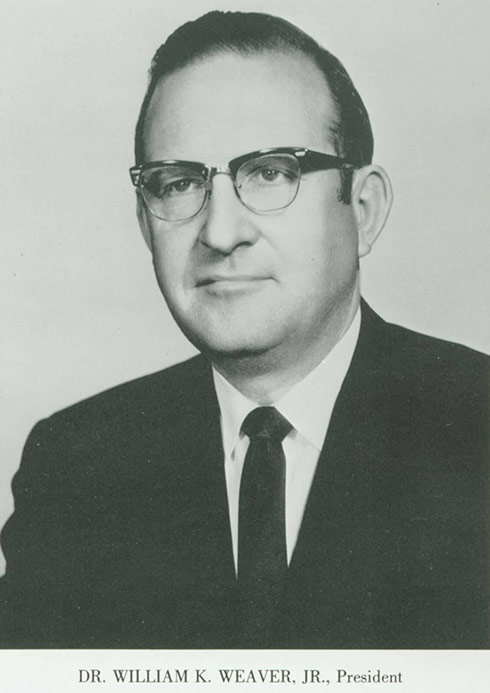
The second President, Dr. Michael A. Magnoli, was inaugurated in 1984. He was a member of the university’s first graduating class of 1967. During his tenure as President, Dr. Magnoli initiated a campus expansion that added acreage, athletic facilities and classroom buildings. Academic programs were added, including the graduate program offering master’s degrees in education, business administration, nursing and theology. In 1985, the intercollegiate athletic program started with two sports, men’s tennis and golf, and quickly expanded.

On July 1, 1993, the institution celebrated its growth by adopting a new name that reflected its continuing development: University of Mobile.
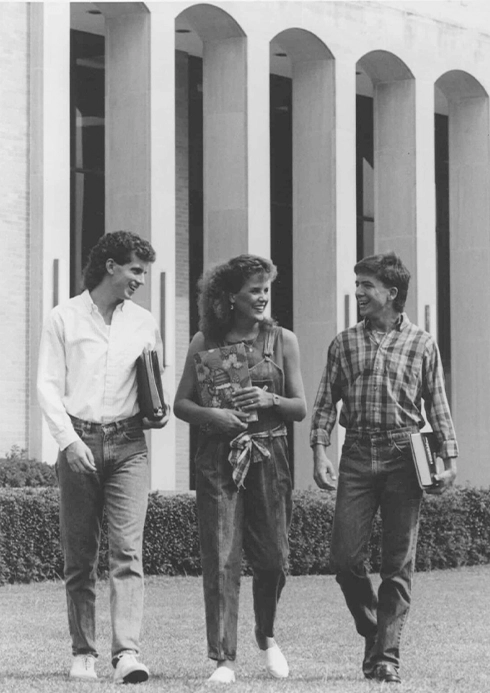
On February 13, 1998, the University of Mobile Board of Trustees unanimously elected Dr. Mark R. Foley as the third president. Under Dr. Foley’s leadership, University of Mobile entered the new millennium with the express purpose of preparing students academically, socially, and spiritually to impact the world. Renovation of Weaver Hall, including a hipped roof with cupola and portico, provided a new focal point for the campus.
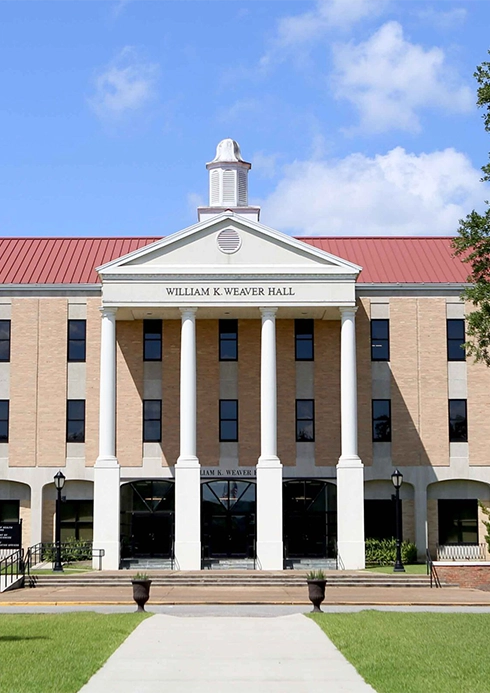
Samford Hall, a 101-bed residence hall, was completed in 2004. In 2006, the 151-bed Karlene Farmer Faulkner Hall opened. In 2009, Ram Hall expanded the cafeteria and provided a state-of-the-art auditorium for student events and concerts. The Timbers, a 96-bed apartment-style residence, was added in 2012. In 2013 the university completed an extensive $7 million campus-wide enhancement project. The university’s Center for Performing Arts was established, a professional recording studio built, and online academic programs were launched. Dr. Foley retired in 2016 after more than 18 years as president.
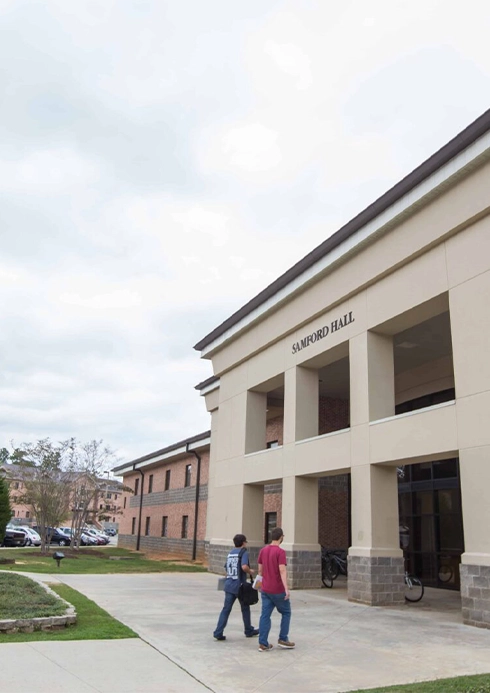
On April 11, 2016, Dr. Timothy L. Smith was named president. The university significantly expanded academic programs and established its first two doctoral programs. Over 34 academic programs were added, nearly doubling offerings to 76 programs. New labs such as the Center for Excellence in Healthcare Practice emphasized practical learning experiences. The university implemented a four-day academic/work week with “Focus Fridays.” Dr. Smith resigned on February 27, 2019.

On November 22, 2019, University of Mobile alumnus Dr. Lonnie Burnett was selected by the Board of Trustees to serve as the institution’s fifth president. A 1979 graduate of the University of Mobile, then Mobile College, Dr. Burnett joined the faculty in 2005 teaching history and rose through the ranks. During his tenure as president, the university overcame the challenges of a global pandemic, renovated and added facilities such as the J.L. Bedsole Sports Performance Complex, established the Lonnie & Lynne Burnett Event Center as a new performance and conference venue, and launched the Experience the Difference marketing campaign.
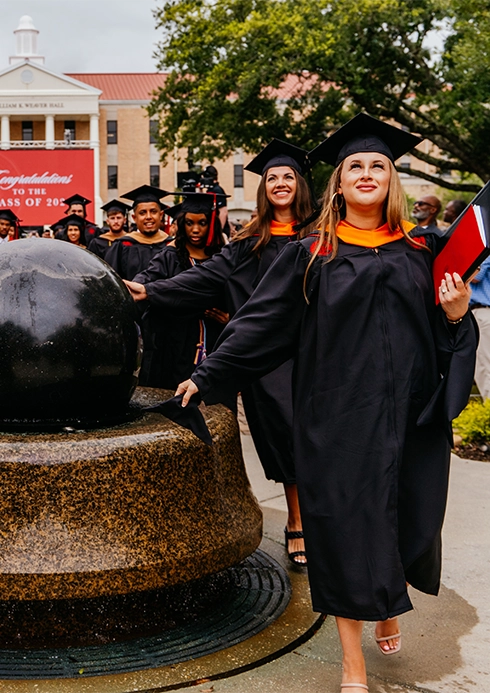
Dr. Charles W. Smith Jr. was named the sixth president of the University of Mobile on March 21, 2024. Today, the University of Mobile is a thriving Christ-centered university with over 75 academic programs offering associate, bachelor’s, master’s and doctoral degrees.
Throughout the decades, the University of Mobile has maintained a highly dedicated faculty providing quality Christian higher education with a devotion to the intellectual and spiritual development of students: Higher Education for a Higher Purpose.

Our Traditions
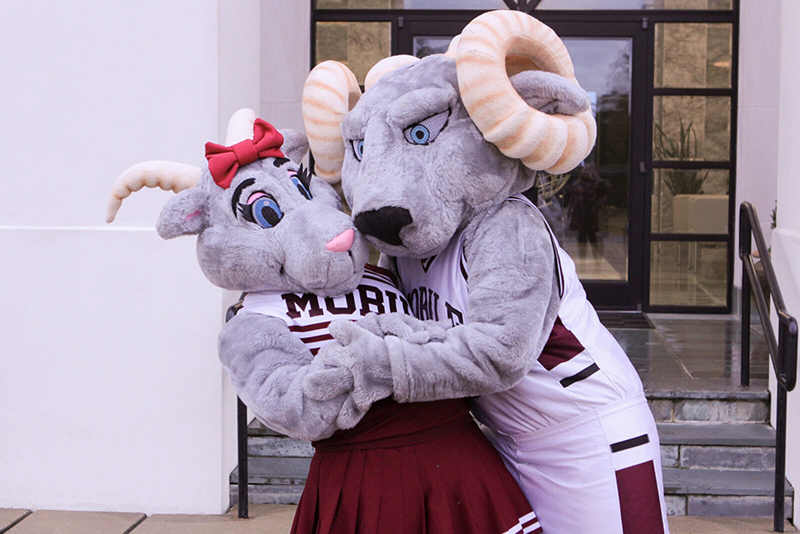
THE RAMS
The first freshman class at the University of Mobile, then Mobile College, was responsible for choosing the school’s mascot in 1963. They considered pioneers, bucks, elephants, falcons, saints and knights before agreeing on a ram – a powerful animal mentioned frequently in the Bible. Four rams, each named Ramses, served as live mascots from 1963 to the late 1970s. When the intercollegiate athletics program started in 1985, the first costumed mascot appeared. MC Ram became Mac the Ram by 1995, when the school changed its name to the University of Mobile. Mac’s girlfriend, Molly, made her debut in 2005. Today, Mac and Molly proudly represent the University of Mobile both on and off campus, and “Go Rams!” is a familiar cheer.
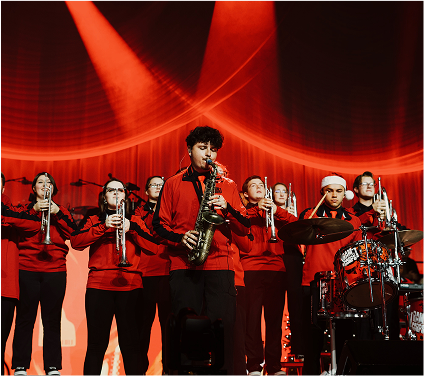
Boar’s Head Festival & Christmas Spectacular
The Christmas season brings to mind different memories to generations of alumni, but the common theme is an over-the-top professional musical extravaganza the community looks forward to each year. From 1971 to 2000 it was The Boar’s Head Festival, a medieval-era celebration that included a banquet for the audience. In 2003, the university launched Christmas Spectacular, a multi-night performance attended by nearly 10,000, with highlights broadcast internationally.

RAM RUSH
When new students and their families step onto the University of Mobile campus for the first time, there is an infectious excitement in the air. Returning students and staff members warmly greet families with open hands, assisting with moving in belongings. It’s the start of Ram Rush, a week-long welcome to college life that includes activities, athletic events, concerts, giveaways, games and massive amounts of free food. Started in 1994, Ram Rush has grown from a week of new student orientation to an experience that involves the entire campus community. Through the years, the first night of Ram Rush has featured fire-breathers, a carnival, a petting zoo, aerial artists, concerts and even a life giraffe in Ram Hall. By the time Ram Rush ends, new students are fully immersed in campus life with new friends who will become lifelong friends.

Covers, Goodwill Gala, Up All Night
Student life at the University of Mobile is filled with traditions. Covers allows students to battle it out on stage performing their favorite songs in front of their peers. Goodwill Gala starts with a trip to thrift stores. Up All Night has been helping students prepare for finals for over 12 years, with an all-night study session put on by faculty for students.
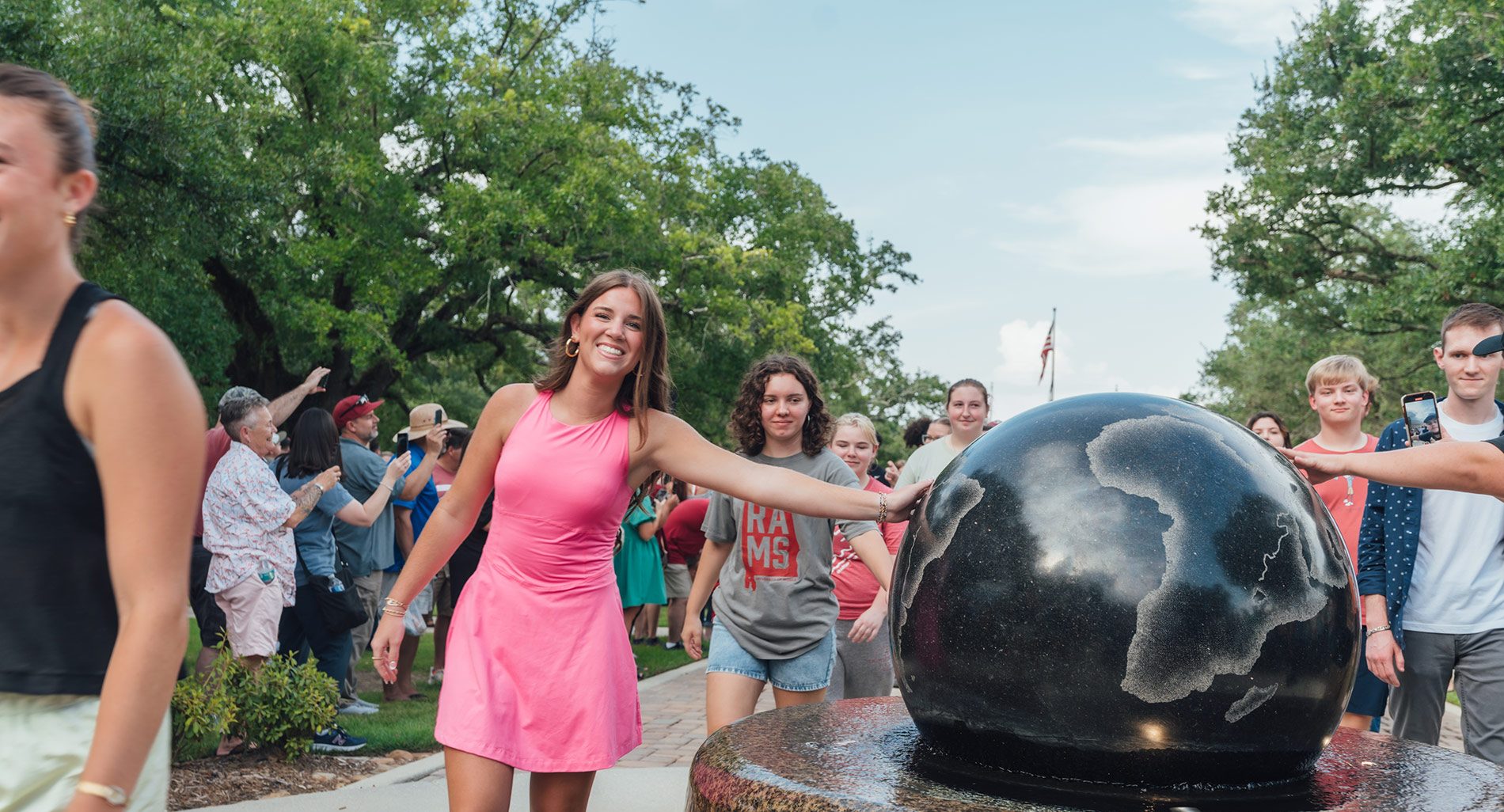
Great Commission Tradition
A new tradition that has deep meaning for University of Mobile students is the Great Commission Tradition. It includes two ceremonies: President’s Commissioning that marks the beginning of a new student’s college experience, and Commencement that signals the beginning of a new graduate’s impact on the world. Its centerpiece is the Great Commission Globe, located at the heart of campus on the Dr. Fred and Sue Lackey Great Commission Lawn. New students touch the globe as they start their college journey, and again during graduation as they receive their degree and start on a new journey. The Great Commission Globe was made possible through a generous gift from the estate of Doris M. Davis.
Request Information


